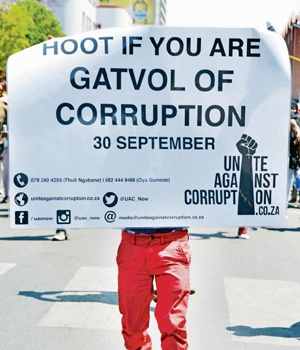
South African public discourse is rightly preoccupied with corruption, particularly this week after the anti-corruption marches in Joburg and Cape Town.
Our discussions and responses, as robust as we would like to believe they are, exhibit significant gaps which, by their existence, are to the benefit of the status quo.
The biggest of these is the perception that corruption is particularly a post-1994 public sector phenomenon, which is inaccurate.
Our discourse, even in the way in which we teach the history of apartheid, conveniently seldom articulates apartheid as grand corruption, which it was in every way.
And this is how we end up with many confident assertions that things were better then and that the apartheid administration was cleaner than the current administration.
While I believe we shouldn’t compare ourselves with apartheid, a time so deliberately and calculatingly atrocious and on such a grand scale that almost anything would be better, it is this inability or unwillingness to accept apartheid as corruption that informs a lot of apartheid nostalgia, even by self-styled lovers of justice, because it is unfathomable that what they are hankering for is a time of corruption.
In a recent Business Day column, Hennie van Vuuren wrote: “The baffling silence on apartheid corruption benefits the powerful and carpetbaggers in the new and old elite. Any attempt to pick at this issue is a threat to the status quo and thus a threat to the interests of politicians and businesspeople across the political spectrum.”
Moreover, the silence on apartheid and the manner in which it was legalised corruption is intentional, and to break it would not only implicate those who benefited from it, but demand a recognition of the humanity of the people who were broken to achieve it.
Part of the way we talk about contemporary corruption relies on the often racist “face of corruption” fat-cat trope.
This is in stark contrast to the grand corruption of the apartheid era, which apparently had no face or beneficiaries – that’s a lie.
That many white people benefited and continue to benefit and then use the “we didn’t know” defence is terrifying (the National Party was adept at covering up the extent of its criminality and theft, particularly when it came to defence and property).
As we try to grapple with current levels of corruption, our discourse has to stop the lie that the previous dispensation was a shining example of clean governance. It was a corruption so grand it seemed invisible.




 Publications
Publications
 Partners
Partners








